Mark Anthony Neal's Blog, page 541
January 29, 2017
Poet Kevin Coval on 'A People's History of Chicago'
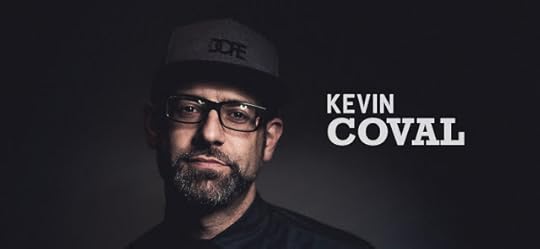 'Poet and founder of Louder Than a Bomb: The Chicago Youth Poetry Festival Kevin Coval visited TheMorningAMp to talk poetry and Chicago's history. He talked with Jesse and Jill about the his new poetry collection, A People's History of Chicago. Coval seeks to tell the history of those whose stories often go unheard through the medium of poetry.' --
Vocalo
'Poet and founder of Louder Than a Bomb: The Chicago Youth Poetry Festival Kevin Coval visited TheMorningAMp to talk poetry and Chicago's history. He talked with Jesse and Jill about the his new poetry collection, A People's History of Chicago. Coval seeks to tell the history of those whose stories often go unheard through the medium of poetry.' --
Vocalo
Published on January 29, 2017 11:35
A Basket of Disposables: Surplus + Value + the People in Between
 'In this segment of Moment of Truth, Jeff Dorchen considers the 40% of humanity left unconsidered by the demands of the corporate caste, the background players just slightly out of focus in the last act of capitalism's romance, the exhaustives, the history rememberers, the grape admirerers, the surplus valued, the yous probably, if not now then soon.' --
This Is Hell! Radio
'In this segment of Moment of Truth, Jeff Dorchen considers the 40% of humanity left unconsidered by the demands of the corporate caste, the background players just slightly out of focus in the last act of capitalism's romance, the exhaustives, the history rememberers, the grape admirerers, the surplus valued, the yous probably, if not now then soon.' --
This Is Hell! Radio
Published on January 29, 2017 11:27
Novel ‘We Hold These Truths’ Examines How Obama Influenced NC Politics
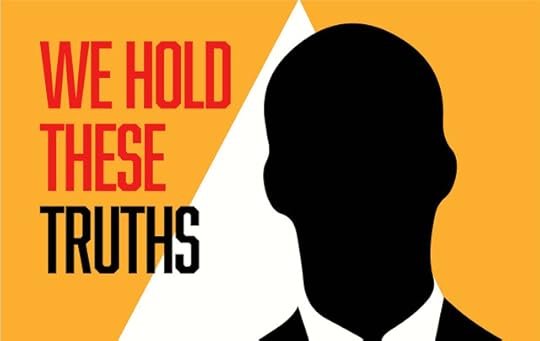 'In 2008, writer David Mitchell watched with the rest of the country as Barack Obama became the first African-American elected president. Mitchell soon became personally involved in politics when his friend Ken Lewis ran for U.S. Senate in North Carolina in 2010. Lewis asked Mitchell to be the campaign manager. They ultimately lost the Democratic primary, but Mitchell used the experience on the campaign trail as the basis for a new novel, We Hold These Truths (Project Z Books/2017). State of Things host Frank Stasio talks with Mitchell and Lewis and their Senate race and the state of the Democratic party.' -- @WUNC-91.5
'In 2008, writer David Mitchell watched with the rest of the country as Barack Obama became the first African-American elected president. Mitchell soon became personally involved in politics when his friend Ken Lewis ran for U.S. Senate in North Carolina in 2010. Lewis asked Mitchell to be the campaign manager. They ultimately lost the Democratic primary, but Mitchell used the experience on the campaign trail as the basis for a new novel, We Hold These Truths (Project Z Books/2017). State of Things host Frank Stasio talks with Mitchell and Lewis and their Senate race and the state of the Democratic party.' -- @WUNC-91.5
Published on January 29, 2017 11:17
“A Mess of Pottage”: Insurgent Black Arts in the Age of Trump by Mark Anthony Neal
 “A Mess of Pottage”: Insurgent Black Arts in the Age of Trumpby Mark Anthony Neal | @NewBlackMan | NewBlackMan (in Exile)
“A Mess of Pottage”: Insurgent Black Arts in the Age of Trumpby Mark Anthony Neal | @NewBlackMan | NewBlackMan (in Exile)As a young scholar about to sit down with the late Amiri Baraka, I was inclined to side with Spike Lee in his now largely forgotten public spat with Mr. Baraka over the representation of Malcolm X in Mr. Lee’s biopic of the Black political icon. Ninety-minutes after Mr. Baraka graciously held court with me and my colleague Gopal Burgher, esq., he had gifted me ideas of Black art that have stayed with me for almost twenty-five years, largely having to do with notions of scale and independence.
At the core of Mr. Baraka’s criticisms of Mr. Lee’s “Malcolm X” was that Mr. Lee had offered a cartoonish image of Malcolm Little, that had capitulated to the pressures of making a Hollywood film (a similar charge that Mr. Baraka later made of Manning Marable’s Pulitzer Prize winning biography Malcolm X: A Life of Reinvention). And while I now chafe at such historical protectionism, Mr. Baraka’s notion, to paraphrase, that Lee would have been better served making a film that could be screened in community centers and basements with a dozen seats, resonates. Contemporarily, meaningful Black Art seems to be wholly tethered -- even in the era of crowdsourcing and so-called democratized digital platforms -- to economic models intended to maximize access to a fickle (and guilty mainstream), and often at the expense of communities most in need of artistic and aesthetic models of insurgency.
I recall my conversation with Mr. Baraka and the NEA/Tongues Untied controversy in response to recent news that the Trump Administration planned to eliminate the NEA and the National Endowment of the Humanities (NEH) and to privatize the Corporation for Public Broadcasting (PBS). Our conversation twenty years ago occurred in the backdrop of the Political Right’s assault on the Arts, in which the late Marlon Riggs’s groundbreaking film about Black male sexuality, Tongues Untied, was ground zero, as several PBS outlets refused to show the film. Late North Carolina Senator Jesse Helms famously accused the National Endowment of the Arts (NEA) of financing “sleaze and slime” in what aounted to $5,000 worth of support for Riggs’s film, while Pat Buchanan (who looks like a Cub Scout leader in comparison to Steve Bannon) accused the Federal Government of “investing our tax dollars in pornographic and blasphemous art too shocking to show."
While critics of the Trump plan have rightly highlighted that such cuts would amount to .016% of the Federal budget, it is clear that the proposed plan has little to do with reining in the Federal debt and has everything to do with silencing artists in a moment that demands an artistic and aesthetic insurgency. The eradication of Federal Funding of the arts has been a fixture of Conservative Right thought for some time, witness the Heritage Foundation’s “Ten Good Reasons to Eliminate Funding for the National Endowment of the Arts,” which among other things describes the NEA as “welfare for cultural elites,” in a clear example of the “pot calling the kettle black.”
Indeed for those visual artists, storytellers, documentarians, historians, archivists, ethnomusicologists and other cultural workers, grants from the NEA and NEH -- like the $5,000 Marlon Riggs received -- could be the difference in completing projects that may have a lasting impact well into the future, as Tongues Untied exemplifies. The challenge is even moreso for those cultural workers who don’t have the support of education institutions like colleges and universities who can augment overhead costs for projects -- and of course we have to wonder how many of those institutions are going to “fall in line” with the administration.
What these new developments mean for cultural workers is that we are going to have to re-imagine the creation and circulation of our work without the support of the kinds of institutions, that admittedly we have already had fraught relationships with. And part of that reimaging is the consideration of scale -- will it be better for our work to resonate within smaller publics, instead to reaching the kind of mainstream audiences that allow for a relative sustainability of both our work and the ability to have such work support our livelihood?
Writer Roxane Gay’s recent decision to pull her forthcoming How to be Heard from Simon & Schuster, because of the publisher’s decision to sign a book deal with White Supremacist thinker Milo Yiannopoulos is an indication of the kinds of decisions Black Cultural workers might have to consider in the near future.
Which brings me back to my conversation with Mr. Baraka, who reflected on James Weldon Johnson’s classic The Autobiography of An Ex-Coloured Man. Initially published anonymously in 1912, with its republication in 1927 with Johnson’s by-line, the book was one of the more important texts of the Harlem Renaissance period. Mr. Baraka though, was fixated on the book’s last line in which the book’s narrator, who has chosen to racially pass for White, admits “I cannot repress the thought, that after all, I have chosen the lesser part, that I have sold my birthright for a mess of pottage.” For Black Cultural workers in the early days of the Trump Regime, the “lesser part” might be the very visibility and mainstream that we all have sought.
***
Mark Anthony Neal been conjuring analog for a digital world for a minute; Check him at @NewBlackMan + @LeftofBlack + BookerBBBrown on the ‘Gram + and the homebase at NewBlackMan (in Exile).
Published on January 29, 2017 07:16
January 28, 2017
The Feminist Movement Under Trump
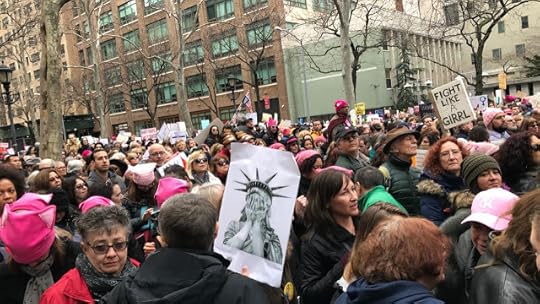 'The Women’s March on Washington and sister marches around the world brought the feminist movement into the limelight once again. But 2017 feminism looks very different from its 1960s counterpart. The intersectionality of women's experiences are being moved to the forefront of the cause. State of Things host Frank Stasio speaks with activist Rosa Clemente; and Lisa Levenstein, a professor of history at the University of North Carolina at Greensboro specializing in women’s movements; and Laila Nur, a community organizer and musician, about how these political decisions affect women and the global women’s movement.' -- WUNC-91.5
'The Women’s March on Washington and sister marches around the world brought the feminist movement into the limelight once again. But 2017 feminism looks very different from its 1960s counterpart. The intersectionality of women's experiences are being moved to the forefront of the cause. State of Things host Frank Stasio speaks with activist Rosa Clemente; and Lisa Levenstein, a professor of history at the University of North Carolina at Greensboro specializing in women’s movements; and Laila Nur, a community organizer and musician, about how these political decisions affect women and the global women’s movement.' -- WUNC-91.5
Published on January 28, 2017 07:26
Left of Black S7:E12: The Legacy of ‘Roots’ -- 40 Years Later
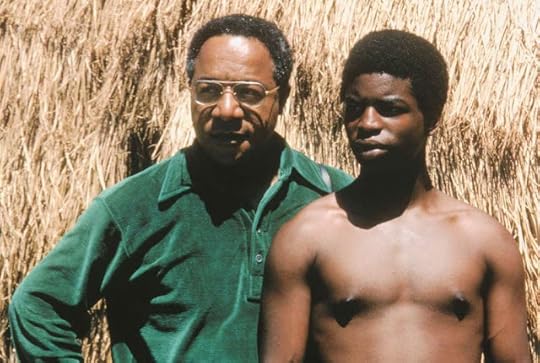 The author Alex Haley with a young Levar Burton
The author Alex Haley with a young Levar BurtonLeft of Black S7:E12: The Legacy of ‘Roots’ -- 40 Years Later
January of 2017 marked the 40th anniversary of the groundbreaking television mini-series Roots. On this episode of Left of Black, historian Wesley Hogan discusses with host Mark Anthony Neal the enduring legacy of Roots, including the impact that Alex Haley’s text has on the field of oral history. Hogan directs the Center for Documentary Studies (CDS) at Duke University.
Left of Black is a weekly Webcast hosted by Mark Anthony Neal and produced in collaboration with the John Hope Franklin Center at Duke University and in conjunction with the Center for Arts + Digital Culture + Entrepreneurship (CADCE) and the Duke Council on Race + Ethnicity
***
Follow Left of Black on Twitter: @LeftofBlack
Published on January 28, 2017 05:52
Jay Smooth: Thoughts On The Women's March That Already Feels Like So Long Ago Because These Are The End Times
 'Jay Smooth with some thoughts on this first week of the Trump regime, and the Women's March that in many ways set the tone for the work that lies before us.'
'Jay Smooth with some thoughts on this first week of the Trump regime, and the Women's March that in many ways set the tone for the work that lies before us.'
Published on January 28, 2017 05:24
January 26, 2017
The Emerging Field of Prince Studies?
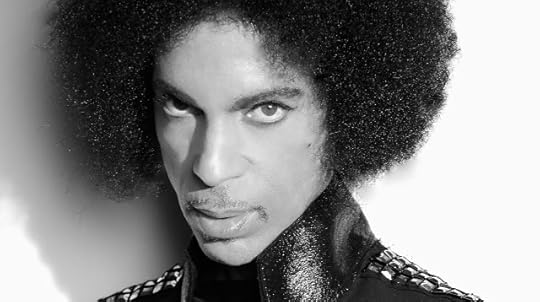 'Writers, musicians, and cultural critics Tisa Bryant, Lynnée Denise, Ernest Hardy and Greg Tate gather to pay tribute and explore the forty-year career of Prince. Drawing on original work, music clips and the emerging field of Prince Studies, cultural workers will consider the impact of Prince on literary culture and beyond.' --
ALOUDla
'Writers, musicians, and cultural critics Tisa Bryant, Lynnée Denise, Ernest Hardy and Greg Tate gather to pay tribute and explore the forty-year career of Prince. Drawing on original work, music clips and the emerging field of Prince Studies, cultural workers will consider the impact of Prince on literary culture and beyond.' --
ALOUDla
Published on January 26, 2017 07:20
January 24, 2017
#BlackCodeStudies: The EP (The B-Side)
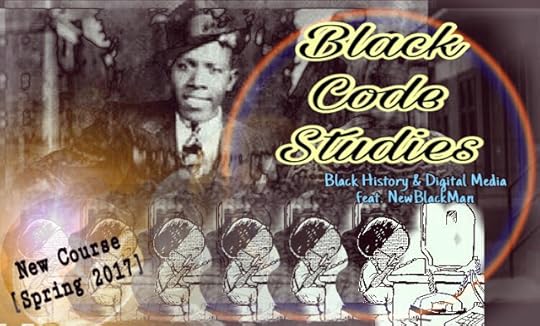 credit: Jessica Marie Johnson#BlackCodeStudies: The EP (The B-Side)
credit: Jessica Marie Johnson#BlackCodeStudies: The EP (The B-Side)Egbe Mi O (Carry Me) | Fela with Ginger Baker diaspora + afterlife + tongue
Rollin’ | Dungeon Family (feat. Society of Soul) fearlessness + flow + aspiration
Telephone | Erykah Badu connectivity + home + transition
Interlude: 6 Legged Griot Trio (weariness) | Me’Shell Ndegeocello embodiment + tradition + truth
1000 Deaths | D’Angelo + The Vanguard formation + memory + route(s)e>
Published on January 24, 2017 17:15
Writer Hilton Als Talks Ruthlessness and Freeing Your Art-Making
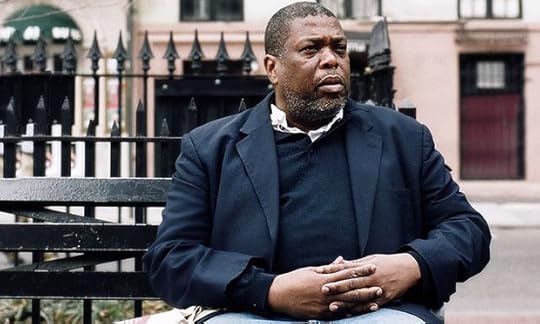 Hilton Als (Sean Pressley) 'Hilton Als is an intellectual omnivore who roots his art and criticism in reality and a search for the truth. A writer, New Yorker theater critic, curator, photographer, director and professor, Als’s work gracefully slips between genres to comment on contemporary American politics, pop culture and the African-American experience and to place the current condition in a longer history. In this tenth and final episode of the first season of Helga, Als and Helga Davis talk about what he learned living next to Sonic Youth's Kim Gordon and Thurston Moore, and how to get comfortable owning your anger and art-making.' -- WQXR
Hilton Als (Sean Pressley) 'Hilton Als is an intellectual omnivore who roots his art and criticism in reality and a search for the truth. A writer, New Yorker theater critic, curator, photographer, director and professor, Als’s work gracefully slips between genres to comment on contemporary American politics, pop culture and the African-American experience and to place the current condition in a longer history. In this tenth and final episode of the first season of Helga, Als and Helga Davis talk about what he learned living next to Sonic Youth's Kim Gordon and Thurston Moore, and how to get comfortable owning your anger and art-making.' -- WQXR
Published on January 24, 2017 12:52
Mark Anthony Neal's Blog
- Mark Anthony Neal's profile
- 30 followers
Mark Anthony Neal isn't a Goodreads Author
(yet),
but they
do have a blog,
so here are some recent posts imported from
their feed.



